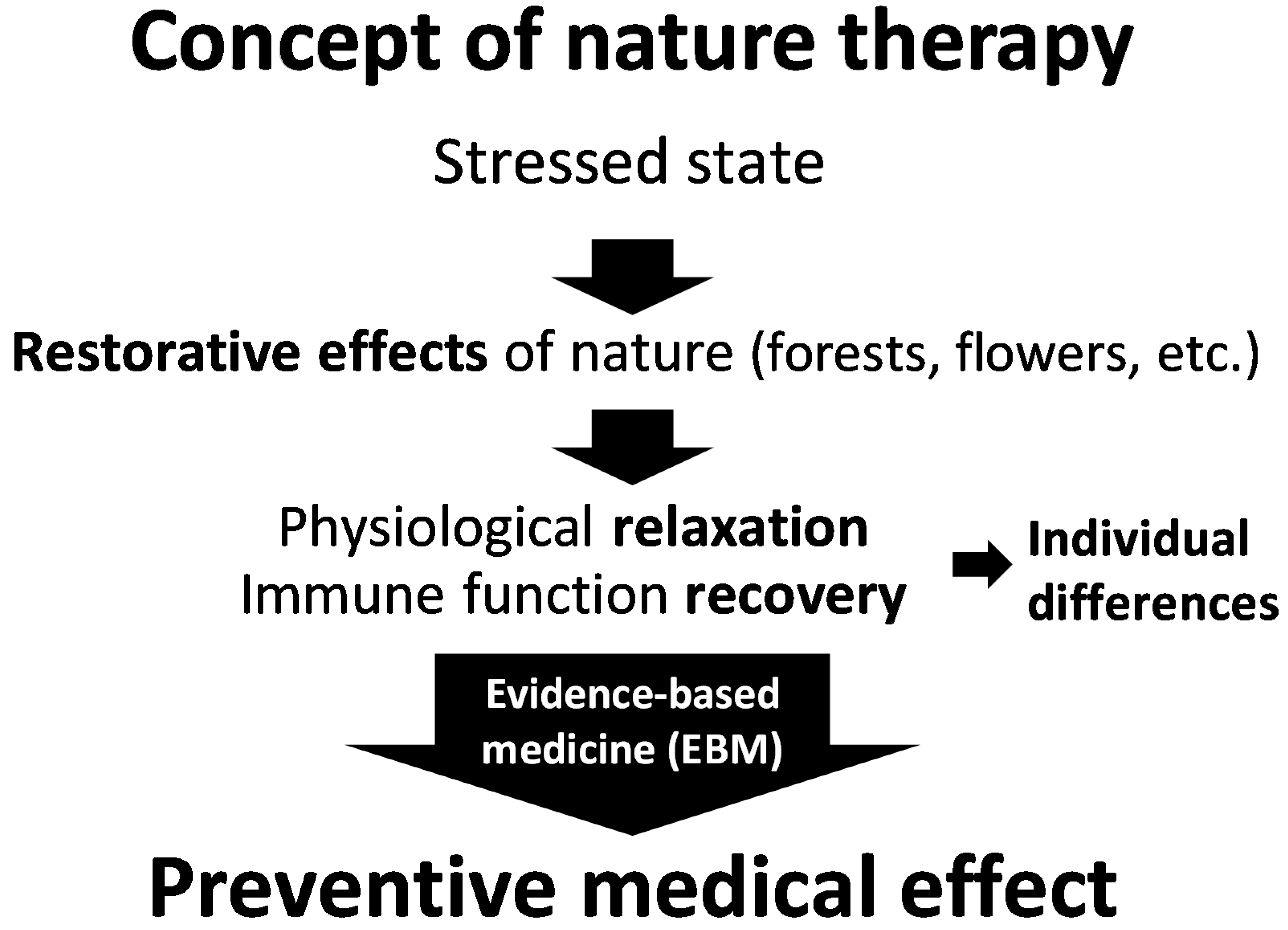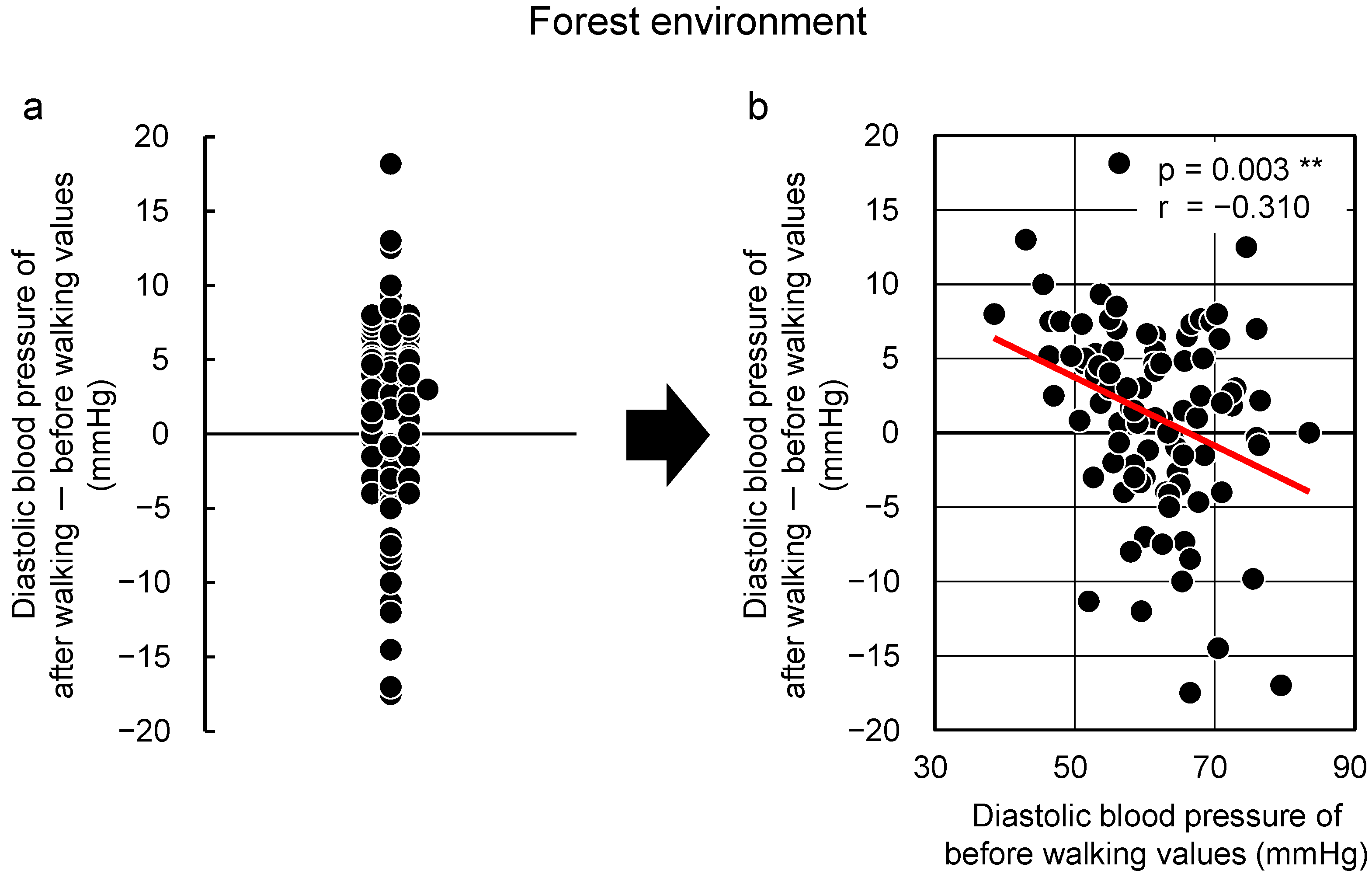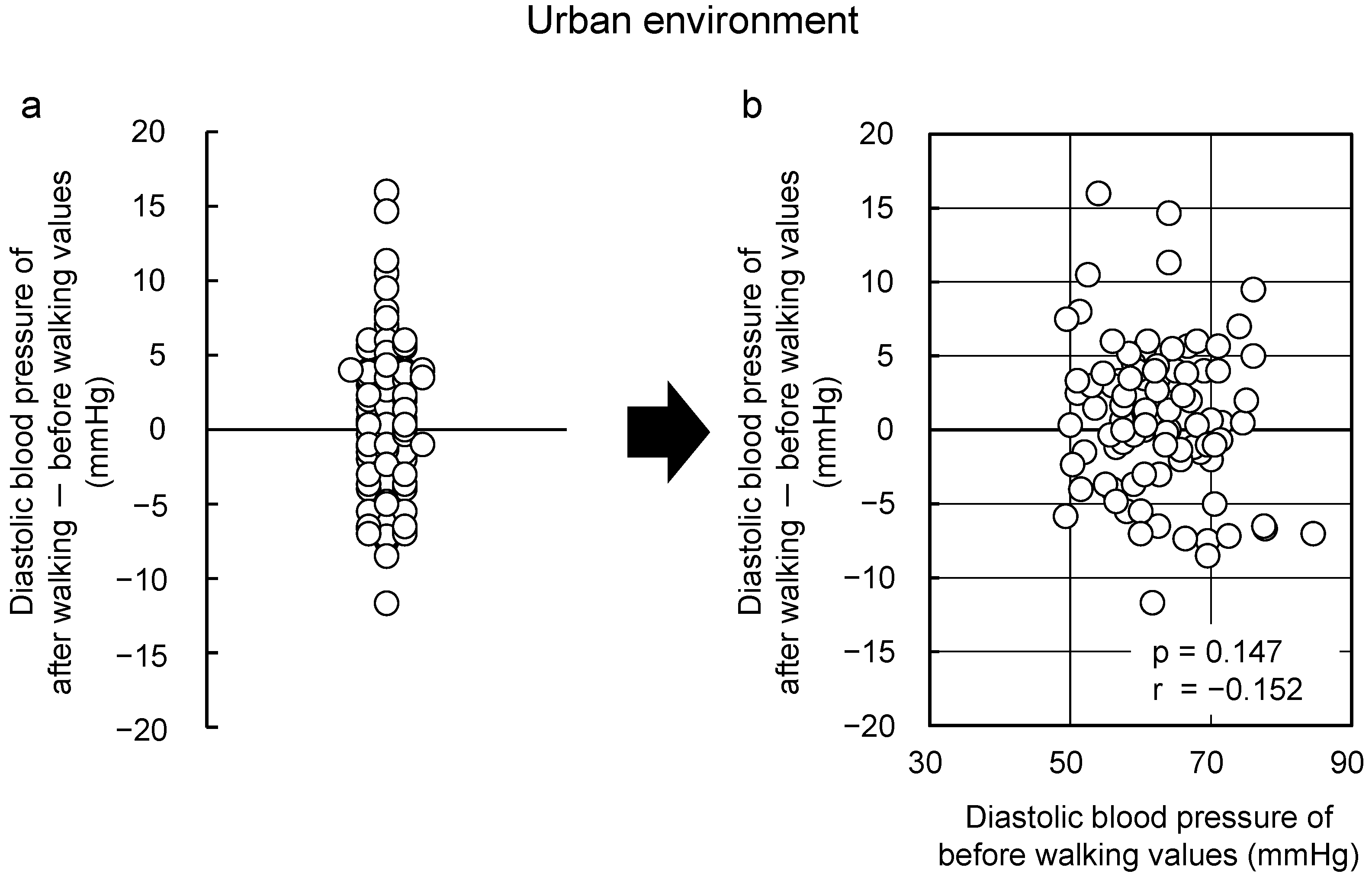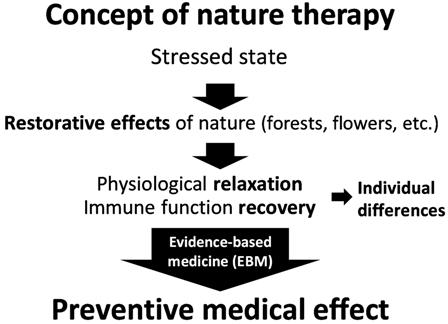Physiological Effects of Nature Therapy: A Review of the Research in Japan
Abstract
:1. Introduction
2. Methods
3. Physiological Effects of Nature Therapy
3.1. Forest Therapy
3.2. Urban Green Space Therapy
3.3. Plant Therapy
3.3.1. Visual Stimulation Experiment
3.3.2. Olfactory Stimulation Experiment
3.4. Wooden Material Therapy
3.4.1. Visual Stimulation Experiment
3.4.2. Olfactory Stimulation Experiment
3.4.3. Tactile Stimulation Experiment
4. Individual Differences in the Physiological Relaxation Effects of Nature Therapy
4.1. Approach of the “Law of Initial Value”
4.2. Approach Employing “Personality”
5. Conclusions
Acknowledgments
Author Contributions
Conflicts of Interest
Abbreviations
| 2D | Two-dimensional |
| 3D | Three-dimensional |
| EBM | Evidence-based medicine |
| EEG | Electroencephalogram |
| HRV | Heart rate variability |
| IgA | Immunoglobulin A |
| NK | Natural killer |
| LF | Low frequency |
| HF | High frequency |
| SD | Semantic differential |
| TRS | Near-infrared time-resolved spectroscopy |
| VOCs | Volatile organic compounds |
| VDT | Visual display terminal |
References
- Miyazaki, Y.; Park, B.J.; Lee, J. Nature therapy. In Designing Our Future: Local Perspectives on Bioproduction, Ecosystems and Humanity; Osaki, M., Braimoh, A., Nakagami, K., Eds.; United Nations University Press: New York, NY, USA, 2011; pp. 407–412. [Google Scholar]
- Brunet, M.; Guy, F.; Pilbeam, D.; Mackaye, H.T.; Likius, A.; Ahounta, D.; Beauvilain, A.; Blondel, C.; Bocherens, H.; Boisserie, J.R.; et al. A new hominid from the Upper Miocene of Chad, Central Africa. Nature 2002, 418, 141–151. [Google Scholar]
- Tanaka, A.; Takano, T.; Nakamura, K.; Takeuchi, S. Health level influenced by urban residential conditions in a megacity—Tokyo. Urban Stud. 1996, 33, 879–894. [Google Scholar] [CrossRef]
- Dye, C. Health and urban living. Science 2008, 319, 766–769. [Google Scholar] [CrossRef] [PubMed]
- Brod, C. Technostress: The Human Cost of the Computer Revolution; Addison Wesley: Boston, MA, USA, 1984. [Google Scholar]
- Ulrich, R.S.; Simons, R.F.; Losito, B.D.; Fiorito, E.; Miles, M.A.; Zelson, M. Stress recovery during exposure to natural and urban environments. J. Environ. Psychol. 1991, 11, 201–230. [Google Scholar] [CrossRef]
- Ulrich, R.S.; Addoms, D.L. Psychological and recreational benefits of a residential park. J. Leis. Res. 1981, 13, 43–65. [Google Scholar]
- Ulrich, R.S. View through a window may influence recovery from surgery. Science 1984, 224, 420–421. [Google Scholar] [CrossRef] [PubMed]
- Kaplan, R.; Kaplan, S. The Experience of Nature: A Psychological Perspective; Cambridge University Press: Cambridge, UK, 1989; pp. 177–200. [Google Scholar]
- Kaplan, S. The restorative benefits of nature: Toward an integrative framework. J. Environ. Psychol. 1995, 15, 169–182. [Google Scholar] [CrossRef]
- Wilson, E.O. Biophilia; Harvard University Press: Cambridge, MA, USA, 1984. [Google Scholar]
- Miyazaki, Y.; Song, C.; Ikei, H. Preventive medical effects of nature therapy and their individual differences. Jpn. J. Physiol. Anthropol. 2015, 20, 19–32. [Google Scholar]
- Lee, J.; Li, Q.; Tyrvainen, L.; Tsunetsugu, Y.; Park, B.J.; Kagawa, T.; Miyazaki, Y. Nature therapy and preventive medicine. In Public Health—Social and Behavioral Health; Maddock, J., Ed.; Intech: Rijeka, Croatia, 2012; pp. 325–350. [Google Scholar]
- Selhub, E.M.; Logan, A.C. Your Brain on Nature: The Science of Nature’s Influence on Your Health, Happiness and Vitality; Wiley: New York, NY, USA, 2012. [Google Scholar]
- Craig, J.M.; Logan, A.C.; Prescott, S.L. Natural environments, nature relatedness and the ecological theater: Connecting satellites and sequencing to Shinrin-yoku. J. Physiol. Anthropol. 2016. [Google Scholar] [CrossRef] [PubMed]
- Miyazaki, Y.; Motohashi, Y. Forest environment and physiological response. In New Frontiers in Health Resort Medicine; Agishi, Y., Ohtsuka, Y., Eds.; Hokkaido School of Medicine Press: Sapporo, Japan, 1996; pp. 67–77. [Google Scholar]
- Tsunetsugu, Y.; Park, B.J.; Miyazaki, Y. Trends in research related to “Shinrin-yoku” (taking in the forest atmosphere or forest bathing) in Japan. Environ. Health Prev. Med. 2010, 15, 27–37. [Google Scholar] [CrossRef] [PubMed]
- Park, B.J.; Tsunetsugu, Y.; Kasetani, T.; Hirano, H.; Kagawa, T.; Sato, M.; Miyazaki, Y. Physiological effects of Shinrin-yoku (taking in the atmosphere of the forest)—Using salivary cortisol and cerebral activity as indicators. J. Physiol. Anthropol. 2007, 26, 123–128. [Google Scholar] [CrossRef] [PubMed]
- Lee, J.; Park, B.J.; Tsunetsugu, Y.; Kagawa, T.; Miyazaki, Y. The restorative effects of viewing real forest landscapes: Based on a comparison with urban landscapes. Scand. J. For. Res. 2009, 24, 227–234. [Google Scholar] [CrossRef]
- Park, B.J.; Tsunetsugu, Y.; Ishii, H.; Furuhashi, S.; Hirano, H.; Kagawa, T.; Miyazaki, Y. Physiological effects of Shinrin-yoku (taking in the atmosphere of the forest) in a mixed forest in Shinano Town, Japan. Scand. J. For. Res. 2008, 23, 278–283. [Google Scholar] [CrossRef]
- Tsunetsugu, Y.; Park, B.J.; Ishii, H.; Hirano, H.; Kagawa, T.; Miyazaki, Y. Physiological effects of “Shinrin-yoku” (taking in the atmosphere of the forest) in an old-growth broadleaf forest in Yamagata prefecture, Japan. J. Physiol. Anthropol. 2007, 26, 135–142. [Google Scholar] [CrossRef] [PubMed]
- Park, B.J.; Tsunetsugu, Y.; Kasetani, T.; Kagawa, T.; Miyazaki, Y. The physiological effects of Shinrin-yoku (taking in the forest atmosphere or forest bathing): Evidence from field experiments in 24 forests across Japan. Environ. Health Prev. Med. 2010, 15, 18–26. [Google Scholar] [CrossRef] [PubMed]
- Park, B.J.; Tsunetsugu, Y.; Lee, J.; Kagawa, T.; Miyazaki, Y. Effect of the forest environment on physiological relaxation-the results of field tests at 35 sites throughout Japan. In Forest Medicine; Li, Q., Ed.; Nova Science Publishers, Inc.: New York, NY, USA, 2012; pp. 55–65. [Google Scholar]
- Lee, J.; Park, B.J.; Tsunetsugu, Y.; Ohira, T.; Kagawa, T.; Miyazaki, Y. Effect of forest bathing on physiological and psychological responses in young Japanese male subjects. Public Health 2011, 125, 93–100. [Google Scholar] [CrossRef] [PubMed]
- Lee, J.; Tsunetsugu, Y.; Takayama, N.; Park, B.J.; Li, Q.; Song, C.; Komatsu, M.; Ikei, H.; Tyrväinen, L.; Kagawa, T.; et al. Influence of forest therapy on cardiovascular relaxation in young adults. Evid. Based Complement. Altern. Med. 2014. [Google Scholar] [CrossRef] [PubMed]
- Tsunetsugu, Y.; Lee, J.; Park, B.J.; Tyrväinen, L.; Kagawa, T.; Miyazaki, Y. Physiological and psychological effects of viewing urban forest landscapes assessed by multiple measurements. Landsc. Urban Plan. 2013, 113, 90–93. [Google Scholar] [CrossRef]
- Park, B.J.; Kasetani, T.; Morikawa, T.; Tsunetsugu, Y.; Kagawa, T.; Miyazaki, Y. Physiological effects of forest recreation in a young conifer forest in Hinokage Town, Japan. Silva. Fenn. 2009, 43, 291–301. [Google Scholar] [CrossRef]
- Song, C.; Ikei, H.; Kobayashi, M.; Miura, T.; Taue, M.; Kagawa, T.; Li, Q.; Kumeda, S.; Imai, M.; Miyazaki, Y. Effect of forest walking on autonomic nervous system activity in middle-aged hypertensive individuals. Int. J. Environ. Res. Public Health 2015, 12, 2687–2699. [Google Scholar] [CrossRef] [PubMed]
- Ochiai, H.; Ikei, H.; Song, C.; Kobayashi, M.; Takamatsu, A.; Miura, T.; Kagawa, T.; Li, Q.; Kumeda, S.; Imai, M.; et al. Physiological and psychological effects of forest therapy on middle-age males with high-normal blood pressure. Int. J. Environ. Res. Public Health 2015, 12, 2521–2531. [Google Scholar]
- Ochiai, H.; Ikei, H.; Song, C.; Kobayashi, M.; Miura, T.; Kagawa, T.; Li, Q.; Kumeda, S.; Imai, M.; Miyazaki, Y. Physiological and psychological effects of forest therapy program on middle-aged females. Int. J. Environ. Res. Public Health 2015, 12, 15222–15232. [Google Scholar] [CrossRef] [PubMed]
- Ohtsuka, Y.; Yabunaka, N.; Takayama, S. Shinrin-Yoku (forest-air bathing and walking) effectively decreases blood glucose levels in diabetic patients. Int. J. Biometeorol. 1998, 41, 125–127. [Google Scholar] [CrossRef] [PubMed]
- Li, Q.; Morimoto, K.; Nakadai, A.; Inagaki, H.; Katsumata, M.; Shimizu, T.; Hirata, Y.; Hirata, K.; Suzuki, H.; Miyazaki, Y.; et al. Forest bathing enhances human natural killer activity and expression of anti-cancer proteins. Int. J. Immunopathol. Pharmacol. 2007, 20, 3–8. [Google Scholar] [PubMed]
- Li, Q.; Morimoto, K.; Kobayashi, M.; Inagaki, H.; Katsumata, M.; Hirata, Y.; Hirata, K.; Suzuki, H.; Li, Y.J.; Wakayama, Y.; et al. Visiting a forest, but not a city, increases human natural killer activity and expression of anti-cancer proteins. Int. J. Immunopathol. Pharmacol. 2008, 21, 117–127. [Google Scholar] [PubMed]
- Li, Q.; Morimoto, K.; Kobayashi, M.; Inagaki, H.; Katsumata, M.; Hirata, Y.; Hirata, K.; Shimizu, T.; Li, Y.J.; Wakayama, Y.; et al. A forest bathing trip increases human natural killer activity and expression of anti-cancer proteins in female subjects. J. Biol. Regul. Homeost. Agents 2008, 22, 45–55. [Google Scholar] [PubMed]
- Li, Q.; Kobayashi, M.; Wakayama, Y.; Inagaki, H.; Katsumata, M.; Hirata, Y.; Hirata, K.; Shimizu, T.; Kawada, T.; Ohira, T.; et al. Effect of phytoncide from trees on human natural killer cell function. Int. J. Immunopathol. Pharmacol. 2009, 22, 951–959. [Google Scholar] [PubMed]
- Ikei, H.; Song, C.; Miyazaki, Y. Physiological effect of olfactory stimulation by Hinoki cypress (Chamaecyparis obtusa) leaf oil. J. Physiol. Anthropol. 2015. [Google Scholar] [CrossRef] [PubMed]
- Takano, T.; Nakamura, K.; Watanabe, M. Urban residential environments and senior citizens’ longevity in megacity areas: The importance of walkable green spaces. J. Epidemiol. Community Health 2002, 56, 913–918. [Google Scholar] [CrossRef] [PubMed]
- Song, C.; Ikei, H.; Igarashi, M.; Miwa, M.; Takagaki, M.; Miyazaki, Y. Physiological and psychological responses of young males during spring-time walks in urban parks. J. Physiol. Anthropol. 2014. [Google Scholar] [CrossRef] [PubMed]
- Song, C.; Ikei, H.; Igarashi, M.; Takagaki, M.; Miyazaki, Y. Physiological and psychological effects of a walk in urban parks in fall. Int. J. Environ. Res. Public Health 2015, 12, 14216–14228. [Google Scholar] [CrossRef] [PubMed]
- Song, C.; Joung, D.; Ikei, H.; Igarashi, M.; Aga, M.; Park, B.J.; Miwa, M.; Takagaki, M.; Miyazaki, Y. Physiological and psychological effects of walking on young males in urban parks in winter. J. Physiol. Anthropol. 2013. [Google Scholar] [CrossRef] [PubMed]
- Igarashi, M.; Miwa, M.; Ikei, H.; Song, C.; Takagaki, M.; Miyazaki, Y. Physiological and psychological effects of viewing a kiwifruit (Actinidia deliciosa “Hayward”) orchard landscape in summer in Japan. Int. J. Environ. Res. Public Health 2015, 12, 6657–6668. [Google Scholar] [CrossRef] [PubMed]
- Matsunaga, K.; Park, B.J.; Kobayashi, H.; Miyazaki, Y. Physiologically relaxing effect of a hospital rooftop forest on elderly women requiring care. J. Am. Geriatr. Soc. 2011, 59, 2162–2163. [Google Scholar] [CrossRef] [PubMed]
- Ikei, H.; Komatsu, M.; Song, C.; Himoro, E.; Miyazaki, Y. The physiological and psychological relaxing effects of viewing rose flowers in office workers. J. Physiol. Anthropol. 2014. [Google Scholar] [CrossRef] [PubMed]
- Ikei, H.; Song, C.; Igarashi, M.; Namekawa, T.; Miyazaki, Y. Physiological and psychological relaxing effects of visual stimulation with foliage plants in high school students. Adv. Hortic. Sci. 2014, 28, 111–116. [Google Scholar]
- Igarashi, M.; Aga, M.; Ikei, H.; Namekawa, T.; Miyazaki, T. Physiological and psychological effects on high school students of viewing real and artificial pansies. Int. J. Environ. Res. Public Health 2015, 12, 2521–2531. [Google Scholar] [CrossRef] [PubMed]
- Igarashi, M.; Yamamoto, T.; Lee, J.; Song, C.; Ikei, H.; Miyazaki, Y. Effects of stimulation by three-dimensional natural images on prefrontal cortex and autonomic nerve activity: A comparison with stimulation using two-dimensional images. Cogn. Process. 2014, 15, 551–556. [Google Scholar] [CrossRef] [PubMed]
- Igarashi, M.; Song, C.; Ikei, H.; Miyazaki, Y. Effect of stimulation by foliage plant display images on prefrontal cortex activity: A comparison with stimulation using actual foliage plants. J. Neuroimaging 2015, 25, 127–130. [Google Scholar] [CrossRef] [PubMed]
- Igarashi, M.; Ikei, H.; Song, C.; Miyazaki, Y. Effects of olfactory stimulation with rose and orange oil on prefrontal cortex activity. Complement. Ther. Med. 2014, 22, 1027–1031. [Google Scholar] [CrossRef] [PubMed]
- Igarashi, M.; Song, C.; Ikei, H.; Ohira, T.; Miyazaki, Y. Effect of olfactory stimulation by fresh rose flowers on autonomic nervous activity. J. Altern. Complement. Med. 2014, 20, 727–731. [Google Scholar] [CrossRef] [PubMed]
- Igarashi, M.; Song, C.; Ikei, H.; Miyazaki, Y. Effects of olfactory stimulation with perilla essential oil on prefrontal cortex activity. J. Altern. Complement. Med. 2014, 20, 545–549. [Google Scholar] [CrossRef] [PubMed]
- Tsunetsugu, Y.; Miyazaki, Y.; Sato, H. Physiological effects in humans induced by the visual stimulation of room interiors with different wood quantities. J. Wood Sci. 2007, 53, 11–16. [Google Scholar] [CrossRef]
- Tsunetsugu, Y.; Miyazaki, Y.; Sato, H. Visual effects of interior design in actual-size living rooms on physiological responses. Build. Environ. 2005, 40, 1341–1346. [Google Scholar] [CrossRef]
- Tsunetsugu, Y.; Miyazaki, Y.; Sato, H. The visual effects of wooden interiors in actual-size living rooms on the autonomic nervous activities. J. Physiol. Anthropol. Appl. Hum. Sci. 2001, 21, 297–300. [Google Scholar] [CrossRef]
- Sakuragawa, S.; Miyazaki, Y.; Kaneko, T.; Makita, T. Influence of wood wall panels on physiological and psychological responses. J. Wood Sci. 2005, 51, 136–140. [Google Scholar] [CrossRef]
- Tsunetsugu, Y.; Park, B.J.; Miyazaki, Y. Physiological effects of visual, olfactory, auditory, and tactile factors in the forest environment. In Forest Medicine; Li, Q., Ed.; Nova Science Publishers Inc.: New York, NY, USA, 2012; pp. 169–181. [Google Scholar]
- Matsubara, E.; Kawai, S. VOCs emitted from Japanese cedar (Cryptomeria japonica) interior walls induce physiological relaxation. Build. Environ. 2014, 72, 125–130. [Google Scholar] [CrossRef]
- Matsubara, E.; Fukagawa, M.; Okamoto, T.; Ohnuki, K.; Shimizu, K.; Kondo, R. The essential oil of Abies sibirica (Pinaceae) reduces arousal levels after visual display terminal work. Flavour Frag J. 2011, 26, 204–210. [Google Scholar] [CrossRef]
- Hiruma, T.; Yabe, H.; Sato, Y.; Sutoh, T.; Kaneko, S. Differential effects of the hiba odor on CNV and MMN. Biol. Psychol. 2002, 61, 321–331. [Google Scholar] [CrossRef]
- Joung, D.; Song, C.; Ikei, H.; Okuda, T.; Igarashi, M.; Koizumi, H.; Park, B.J.; Yamaguchi, T.; Takagaki, M.; Miyazaki, Y. Physiological and psychological effects of olfactory stimulation with D-limonene. Adv. Hort. Sci. 2014, 28, 90–94. [Google Scholar]
- Ikei, H.; Lee, J.; Song, C.; Miyazaki, Y. Comparison of the effects of olfactory stimulation by air-dried and high temperature-dried wood chips of hinoki cypress (Chamaecyparis obtusa) on prefrontal cortex activity. J. Wood Sci. 2015, 61, 537–540. [Google Scholar] [CrossRef]
- Morikawa, T.; Miyazaki, Y.; Kobayashi, S. Time-series variations of blood pressure due to contact with wood. J. Wood Sci. 1998, 44, 495–497. [Google Scholar] [CrossRef]
- Sakuragawa, S.; Kaneko, T.; Miyazaki, Y. Effects of contact with wood on blood pressure and subjective evaluation. J. Wood Sci. 2008, 54, 107–113. [Google Scholar] [CrossRef]
- Wilder, J. The “law of initial values,” a neglected biological law and its significance for research and practice. Translated from Zeitschrift fur die gesamte Neurologie und Psychiatric, 137, 317–338. In Psychophysiology; Porges, S.W., Coles, M.G.H., Eds.; Dowden, Hutchinson, & Ross, Inc.: Stroudsburg, PA, USA, 1931; pp. 38–46. [Google Scholar]
- Wilder, J. Stimulus and Response: The Law of Initial Value; J. Wright Press: Bristol, UK, 1967. [Google Scholar]
- Lacey, J.I. The evaluation of autonomic responses: Toward a general solution. Ann. N. Y. Acad. Sci. 1956, 67, 125–163. [Google Scholar] [CrossRef] [PubMed]
- Hord, D.J.; Hojnson, L.C.; Lubin, A. Differential effect of the law of initial value (LIV) on autonomic variables. Psychophysiology 1964, 1, 79–87. [Google Scholar] [CrossRef] [PubMed]
- Bloch, J.D.; Bridger, W.H. The law of initial value in psychophysiology: A reformulation in terms of experimental and theoretical considerations. Ann. N. Y. Acad. Sci. 1962, 98, 1229–1241. [Google Scholar] [CrossRef]
- Rogers, R.L.; Meyer, J.S.; Mortel, K.F.; Mahurin, R.K.; Thornby, J. Age-related reductions in cerebral vasomotor reactivity and the law of initial value: A 4-year prospective longitudinal study. J. Cereb. Blood Flow Metab. 1985, 5, 79–85. [Google Scholar] [CrossRef] [PubMed]
- Scher, H.; Furedy, J.J. Individual differences in phasic cardiac reactivity to psychological stress and the law of initial value. Psychophysiology 1985, 22, 345–348. [Google Scholar] [CrossRef] [PubMed]
- Song, C.; Ikei, H.; Miyazaki, Y. Elucidation of a physiological adjustment effect in a forest environment: A pilot study. Int. J. Environ. Res. Public Health 2015, 12, 4247–4255. [Google Scholar] [CrossRef] [PubMed]
- Tsunetsugu, Y.; Miyazaki, Y. Correlation between baseline value and amount of change in salivary cortisol concentration and salivary immunoglobulin A concentration. J. Physiol. Anthropol. 2007, 26, 612. [Google Scholar]
- Park, B.J.; Morikawa, T.; Ogata, T.; Washida, K.; Iwamoto, M.; Nakamura, H.; Miyazaki, Y. Physiological effects of ingesting eucalyptus essential oil with milk casein peptide. Silva Fenn. 2009, 43, 173–179. [Google Scholar] [CrossRef]
- Song, C.; Ikei, H.; Lee, J.; Park, B.J.; Kagawa, T.; Miyazaki, Y. Individual differences in the physiological effects of forest therapy based on Type A and Type B behavior patterns. J. Physiol. Anthropol. 2013. [Google Scholar] [CrossRef] [PubMed]
- Miyazaki, Y.; Tsunetsugu, Y. A tentative proposal on physiological polymorphism and its experimental approaches. J. Physiol. Anthropol. Appl. Hum. Sci. 2005, 24, 297–300. [Google Scholar] [CrossRef]
- Friedman, M.; Rosenman, R.H. Type A Behavior Pattern and Your Heart; Knopf Press: New York, NY, USA, 1974. [Google Scholar]
- Jenkins, C.D.; Rosenman, R.H.; Zyzanski, S.J. Prediction of clinical coronary heart disease by a test for the coronaryprone behavior pattern. N. Engl. J. Med. 1974, 290, 1271–1275. [Google Scholar] [CrossRef] [PubMed]



© 2016 by the authors; licensee MDPI, Basel, Switzerland. This article is an open access article distributed under the terms and conditions of the Creative Commons Attribution (CC-BY) license (http://creativecommons.org/licenses/by/4.0/).
Share and Cite
Song, C.; Ikei, H.; Miyazaki, Y. Physiological Effects of Nature Therapy: A Review of the Research in Japan. Int. J. Environ. Res. Public Health 2016, 13, 781. https://doi.org/10.3390/ijerph13080781
Song C, Ikei H, Miyazaki Y. Physiological Effects of Nature Therapy: A Review of the Research in Japan. International Journal of Environmental Research and Public Health. 2016; 13(8):781. https://doi.org/10.3390/ijerph13080781
Chicago/Turabian StyleSong, Chorong, Harumi Ikei, and Yoshifumi Miyazaki. 2016. "Physiological Effects of Nature Therapy: A Review of the Research in Japan" International Journal of Environmental Research and Public Health 13, no. 8: 781. https://doi.org/10.3390/ijerph13080781
APA StyleSong, C., Ikei, H., & Miyazaki, Y. (2016). Physiological Effects of Nature Therapy: A Review of the Research in Japan. International Journal of Environmental Research and Public Health, 13(8), 781. https://doi.org/10.3390/ijerph13080781








